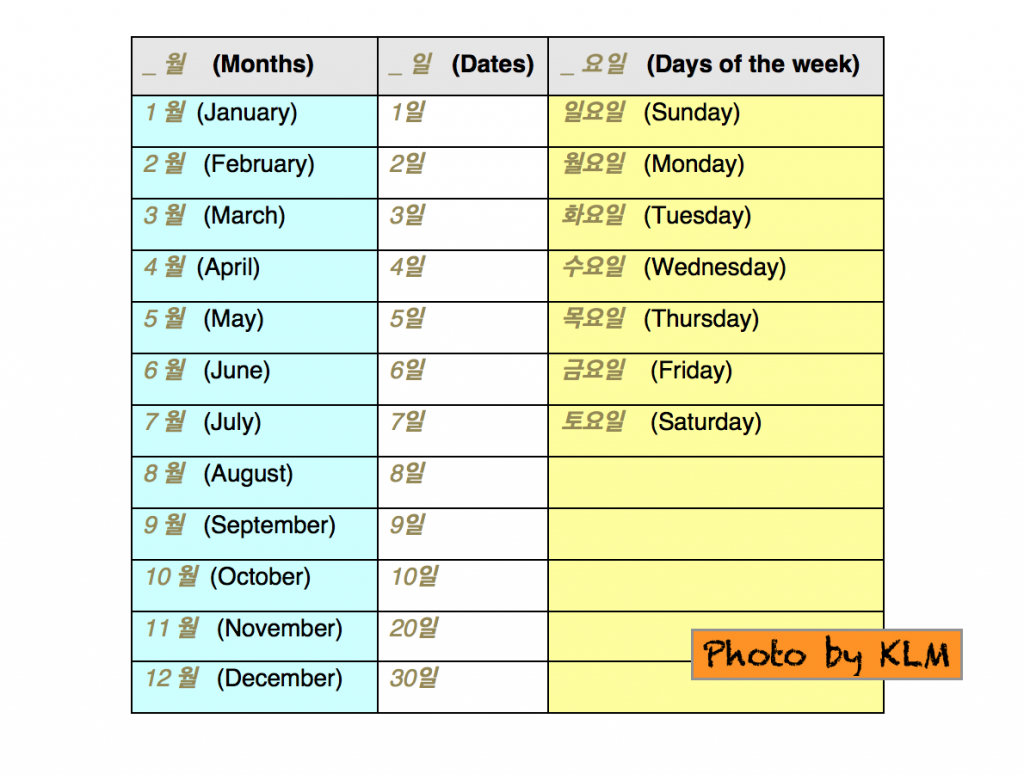Simple Calendar Vocabulary in Korean Posted by Kyung-Hwa on Dec 6, 2017 in Korean Language, Vocabulary
Can you believe the end of the year 2017 is approaching? In December, many people plan a 송년회 (year-end-party) with friends, family members, and co-workers. When you plan a party, set up a meeting, or simply talk about your routines, your calendar plays an important role. How familiar are you with the Korean vocabulary related to the calendar?
In this post your will learn how to say days of the week, dates of the month, months of the year, and years. When you write or talk about them in Korean, here is an important tip for you to remember. Unlike English, the format starts with a bigger unit first ( Year-month-date-day of the week). You can compare the differences from the following example.
Wednesday, December 6, 2017 in English becomes 2017년 12월 6일 수요일 in Korean.
By looking at the chart, you can probably figure out the simple patterns for the months, dates, and days of the week.
- “–년 ” is a word for a “year” in Korean, and you can simply add the Sino Korean numbers to “년 ” to talk about the specific year. The year 2017 is “2017년 (이천십칠 년 )” in Korean. The word for 1,000 is “천” , so the year 2,000 becomes “이천 = 이 (2) + 천(1,000)” and 17 is “십칠 = 십(10) + 칠(7).”
Ex) 2016년 (이천십육 년) – Year 2016
2017년 (이천십칠 년) – Year 2017
2018년 (이천십팔 년) – Year 2018
- “–월” is a word for a month in Korean, and you also use Sino Korean to refer each month of the year.
Ex) 1월 (일 월 – January), 2월 (이 월 – February), and so on.
- “–일” refers to a day after Sino Korean numbers 1-31.
Ex) 1일 (일 일), 2일 (이 일), 3일 (삼 일), etc.
- “– 요일” is used to talk about days of the week. Interestingly, each name has a special meaning that is derived from the Chinese language. The names of these refer to the sun (일요일-Sunday), moon (월요일 – Monday), fire (화요일 – Tuesday), water (수요일 – Wednesday), tree (목요일 – Thursday), gold/metal (금요일 – Friday), and earth (토요일 – Saturday).
Once you memorize the above short list of vocabulary, you will soon be able to apply your learning to organize a party, plan a meeting, or simply talk about your routines. Just one thing to remember, as I mentioned in the beginning of the post, the format for the dates in Korean starts with a bigger unit and then moves to a smaller unit, such as “year-month-date-day of the week.”
Ex) 2017년 12월 31일 일요일 (Sunday, December 31, 2017)
12월 31일 일요일 (Sunday, December 31)
감사합니다! (Thank you!)

Build vocabulary, practice pronunciation, and more with Transparent Language Online. Available anytime, anywhere, on any device.




